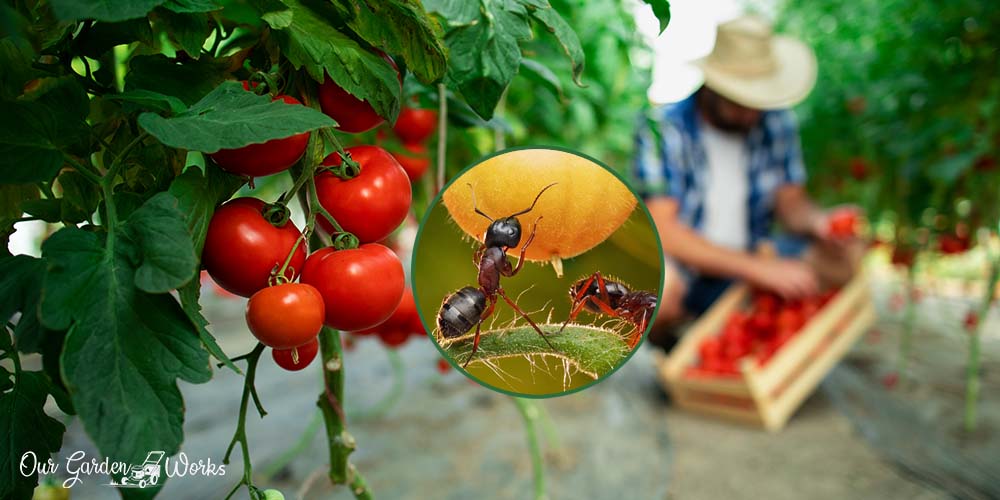As if aphids and other insects are not enough, ants might also be one of the frequent visitors of your tomato plants.
Before you craft your exterminator mode for these small crawlers, it’s essential to understand the pros and cons of having ants in your garden.
In this post, we will discuss why ants love being around your tomato plants. We will also share the different methods how to get rid of ants if they start attacking your tomatoes.
First, let’s get into the reason why ants are so attracted to your tomatoes.
Why Are Ants Attracted To Tomatoes?
If you think ants are feeding on your tomatoes, it’s not the case. Ants are feeding on the honeydew that the aphids collect from the tomato plants.
They might also be looking for larvae that they can attack. Therefore, the presence of ants in your tomatoes means they’re are also infested with other pests.
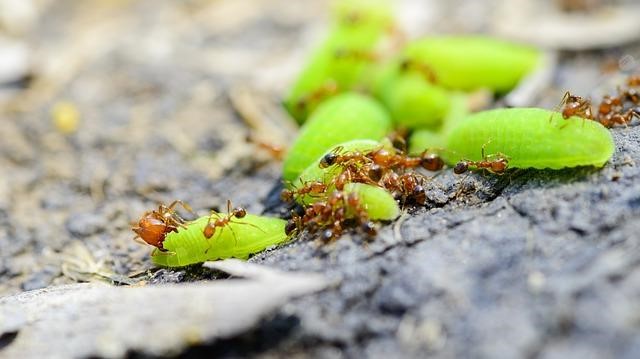
While it’s a good idea to use insecticides to clear out all the bugs near your tomatoes, they’re not a one-size-fits-all solution.
Most insecticides have an active ingredient that targets specific insects mostly found in tomatoes like aphids but not with ants.
Therefore, you need another treatment for the ants and another for the tomato pests. You have two options in controlling ants. It’s either you use chemicals or make some eco-friendly concoctions in your kitchen.
Some homemade insecticides can kill both insects and ants, but the residual effect may not be as strong as that of its chemical counterparts.
Effective Ways To Control Ants in Your Garden
You have three strategies in dealing with ants in your tomato plants. It’s targeting the insects that attract the ants, killing or controlling the ants yourself, or using other insects to do the job for you.
However, before we head to the methods, we’d like to warn you about controlling ants in your garden.
Benefits of Ants in Your Garden
If the ants in your garden do not cause headaches as much as their entire colony, you might want to skip on controlling them. With the right numbers, ants are beneficial to your garden.
Here are the reasons why:
- Help aerate the soil: Your plant’s roots and the microorganisms in the soil also need oxygen for optimal performance. Ants are among the best crawlers in your garden that dig into the soil and leave pockets of spaces that prevent your soil from getting compacted.
- Beneficial predators to other pests too: Ants aids gardeners as natural pest control in your garden. As easy as it is to judge them for being a pest, ants eat the eggs and babies of the pests.
- Indirect pollinators: Pollens can cling to ants as they move from one flower to the other. If bees are not around and most gardeners rely on other pollinators like ants.
How To Control Ants in Your Garden?
If the ants in your gardens are more of a headache than an ally, here are some ways to control them:
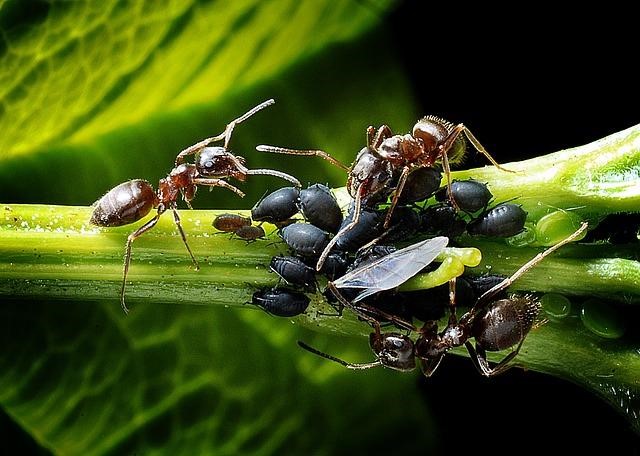
1. Targeting The Source: Aphids and Larvae
If you’ve decided to get rid of the reason why ants love your tomato plants, here are some tips:
- Organic Insecticides: Probably the easiest way to get rid of pests is to use organic pesticides that you can use until the harvest day. For starters, you can use neem oil or horticultural oil. Neem oil is an organic insecticide, fungicide, and miticide for tomatoes.
- Pesticides for larvae: Bt or Bacillus Thuringiensis is a biological insecticide for controlling worms in tomatoes. Ants are also feeding on larvae so, might as well hit two birds with one stone and protect your tomato fruits from both worms and ants.
2. Controlling The Ants
If you want to directly get rid of the ants yourself, here are several methods that you can try:
Use The Plants and Organic Materials That Ants Hate
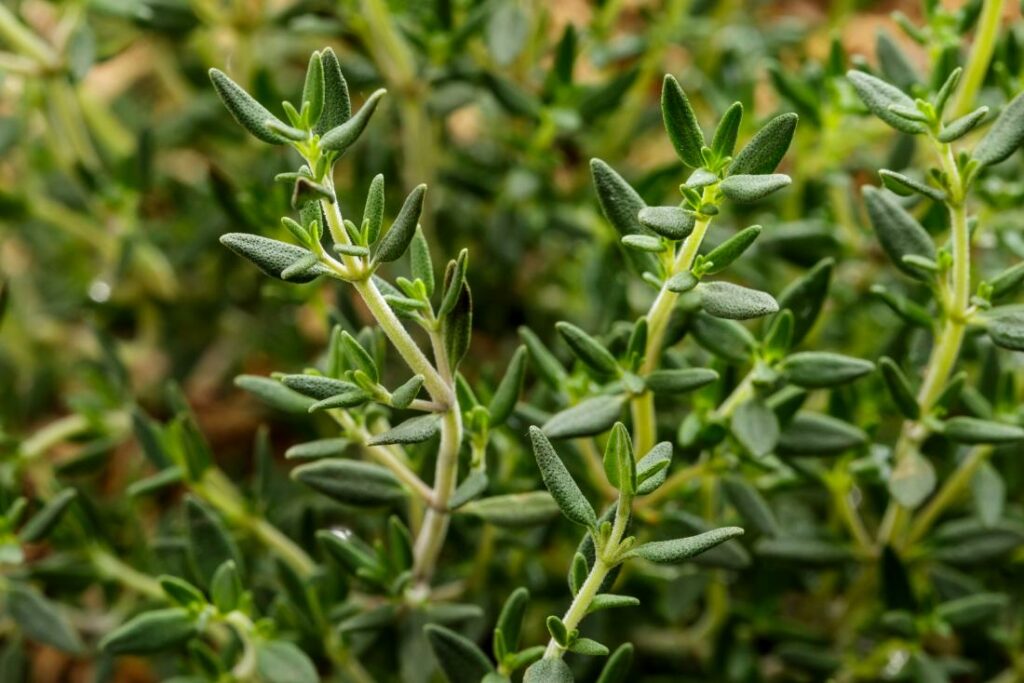
Ants are persistent. However, they hate the smell of some plants.
If you want them to keep away from your tomato plants, you can place the following plants and organic matters near your tomatoes:
- Thyme
- Rosemary
- Lavender
- Tansy
- Peppermint
- Spearmint
- Pennyroyal
- Catnip
- Cucumber and orange peels
Insecticides For Ants
If you want an easy fix where you want to kill the whole colony or get rid of their nest, insecticides for ants are the best way to go. You can use solutions with an active ingredient of avermectin, fipronil, and cypermethrin.
You may also use diatomaceous earth as an insecticide for both ants and tomato pests. It is a powdered fossilized marine phytoplankton that has a texture of baking soda.
Boiling Water
Get rid of the ants in whiplash with a kettle full of hot boiling water. However, you must pour it on their nest and not on your tomatoes.
Home-Made Solutions
Most of the materials that you need to deter ants are found in your kitchen. These solutions will help as a contact insecticide and have no residual effects like synthetic insecticides.
Pro tip: Make sure to do a patch test first using the solution you made. Look for signs of burn and add more water if the solution burns your plants.
These include:
- Soap solution: Mix a tablespoon of dishwashing soap with two cups of water and spray directly on ants on sight. It works by coating and drowning the ants until they get suffocated.
- Lemon spray: To disorient the ants from their lines, mix 1 cup of lemon juice and 1 cup of water in a spray bottle. Shake it well and apply it directly on the ants or on the areas where you always see them crawling.
- Cinnamon: The scent of cinnamon can also deter ants. You can sprinkle the cinnamon powder around your tomatoes to keep them away.
- Vinegar spray: Vinegar is one of the most useful cleaning agents in every household. It is also effective in controlling pests and ants. Use it as a contact insecticide by mixing 1 cup of vinegar with a cup of water in a spray bottle.
- Cayenne or black pepper spray: Ants dislike the strong smell and spice of peppers. Use it against them by micing two tablespoons of either cayenne or black pepper to a cup of water.
- Garlic solution: Garlic is not only antibacterial but also a natural insecticide. Mince 18 medium-sized cloves of garlic and mix them with two tablespoons of mineral oil. Let it sit for a day before you mix it with two tablespoons of dish soap and a pint of water. Drain the garlic and use it directly on ants.
- Salt: Place salt on the trail of ants in your garden. Don’t put too much as it may affect the health of your tomatoes. You may also place it around their nest to contain them.
- Baking soda and sugar mix: Lure ants into eating baking soda by mixing them. Once ingested, the baking soda will disturb their digestive system and die eventually.
- Coffee grounds: Coffee grounds can serve as both fertilizer and insecticide for your tomatoes. Coffee grounds are rich in nitrogen which encourages growth in plants. Plus, ants and slugs hate their smell.
3. Using The Help of Predator Animals and Insects
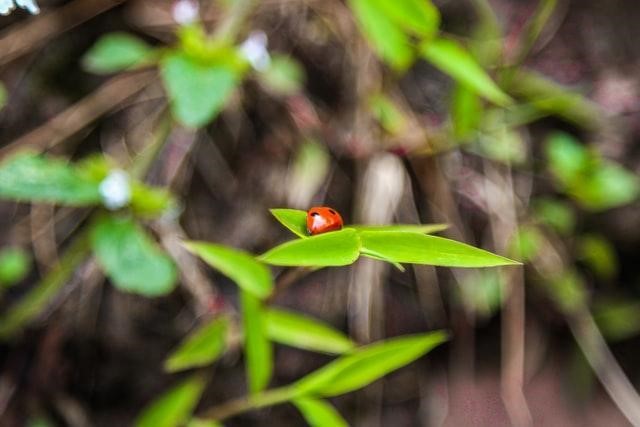
Let nature help you control the ants on tomato plants.
Some gardeners even use biological pest control where they grow or collect the predators of the pests in their farms and release them when the pests are swarming over the crops.
Compared to other pest control, using predator insects or animals is more cost-efficient and eco-friendly. It’s more like nature is taking its course. To control the ants and pests in your tomatoes, you may use the help of the following insects/animals:
- Ladybugs
- Green or brown lacewings
- Soldier beetles
- Frogs
- Birds such as sparrow and starlings
- Lizards
- Black widow spider
- Flies
Frequently Asked Questions (FAQs) About Ants on Tomato Plants
Can Ants kill tomato plants?
Ants can’t kill tomato plants simply because they are not the ones attacking them. Ants are attracted to tomatoes because of the honeydew harvested by aphids.
So, the presence of ants in your tomato plant is an indication that it is infested.
Do coffee grounds kill ants?
Coffee grounds can’t kill ants but they hate it. Coffee grounds are also effective in deterring insects like slugs, mosquitoes, and wasps. Sprinkle it around your tomato plants to keep the ants at bay.
Coffee grounds are also an excellent source of nitrogen which makes them both an insecticide and a fertilizer for plants.
Will soapy water kill tomato plants?
Too concentrated soapy water can cause dehydration on the leaves of plants. However, if it’s adequately diluted, soapy water is an environment-friendly approach in controlling pests.
Will vinegar kill plants?
Vinegar contains an acetic acid that can dissolve the waxy layer on leaves. Without the waxy layer, the leaves will be more dehydrated and die eventually. To be an effective insecticide, vinegar must be mixed with mineral oil and water.
Will hydrogen peroxide kill ants?
While some species of ants die with hydrogen peroxide, some studies found that some rare species drink hydrogen peroxide to heal themselves.
Therefore, it’s not a recommended solution to deter ants. Instead, you may use coffee grounds, soapy water, and other homemade solutions to control ants.
Will vinegar and baking soda kill ants?
Yes. Baking soda can kill ants as soon as they ingest it. It’s one of the environment-friendly ways to control plants. On the other hand, the strong acid and scent of vinegar only repels ants but does not necessarily kill them.
Why does white vinegar kill ants?
Vinegar doesn’t kill ants. They just hate its smell and repel away from it. The strong scent of vinegar also alters the trail that they leave for other ants, making them lose their way and their tracks.
What soap is safe for plants?
Dishwashing soaps are the most affordable soaps that you can use for soapy water solutions. There are also ready-to-use insecticidal soaps available online which are more designed to control pests.
How do you find an ant’s nest?
Finding an ant’s nest can be hard to track due to its size and ability to sneak into the nooks and crannies of your home. Instead of following the tracks of a single ant, identify the most viable location for their nest. These include:
– Dirt mounds
– Rotten wood
– Plants infected with aphids
Do ants bring aphids?
No. It’s quite the opposite. Ants follow aphids because they benefit from their ability to suck on the honeydew from plants. However, in some cases, ants also bring aphids to their nest to get all the honeydew from the aphids.
Final Thoughts
Ants are fairly easy to control if you find their nest or the pest that they’re feeding on.
However, make sure to control them the first time you try as they have are one of the highly organized organisms on the planet. They can work together when dealing with attacks from humans and other predators.
On a side note, we suggest that you should take your time deciding if it’s necessary to control them or not.
As we mentioned in this post, ants play an essential role in your garden’s ecosystem. Also, focus first on controlling the other pests like aphids first as they’re more detrimental to your tomatoes.
We hope that these tips helped you control the ants on tomato plants in your garden. We hope that your tomatoes remain as safe as possible during this growing season.
If you want to learn more about tomato plant care, you may visit our posts about the best fungicides and pesticides for tomatoes.
If you find this post helpful, please don’t forget to share this post with your fellow gardeners and enjoy a bountiful harvest this year.
If you tried one of our methods in this post, share your experience in the comments below! We’re excited to see your progress.
